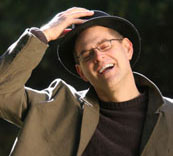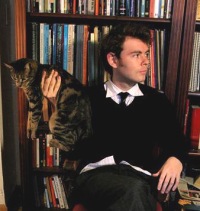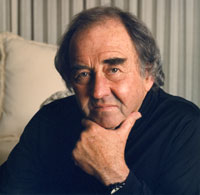 I must confess that composer Douglas J. Cuomo has only recently appeared on my radar screen. That may mean that I’m not paying enough attention or it could mean that I never watched Sex and the City and thus avoided the theme, which is Cuomo’s most famous, and probably lucrative, credit. In any event, Cuomo is currently having a career season in “serious” music. A few months ago, Allan Kozinn selected Cuomo’s Arjuna’s Dilemma–which previewed this summer at the Pepsico Theater in Purchase–as one of the top picks for the new season, describing the 70-minute multimedia work as “a compelling opera based on the Bhagavad-Gita, the sacred Hindu text, set in a musical language that draws on Western and Indian styles.”
I must confess that composer Douglas J. Cuomo has only recently appeared on my radar screen. That may mean that I’m not paying enough attention or it could mean that I never watched Sex and the City and thus avoided the theme, which is Cuomo’s most famous, and probably lucrative, credit. In any event, Cuomo is currently having a career season in “serious” music. A few months ago, Allan Kozinn selected Cuomo’s Arjuna’s Dilemma–which previewed this summer at the Pepsico Theater in Purchase–as one of the top picks for the new season, describing the 70-minute multimedia work as “a compelling opera based on the Bhagavad-Gita, the sacred Hindu text, set in a musical language that draws on Western and Indian styles.”
The Brooklyn Academy of Music will present Arjuna’s Dilemma at the Harvey Theater on November 5, 7, and 8 (7:30 pm) as part of BAM’s Next Wave Festival.
In yesterday’s Sunday Times, Matthew Gurewitsch writes more about Arjuna’s Dilemma and others works (like Philip Glass’ Satyagraha and John Adams’ Doctor Atomic) that draw from the Gita. According to his account, Cuomo was looking for a project that would team the Indian singer Amit Chatterjee with western voices. As Krishna, Chatterjee improvises segments of the score in raga style, in Sanskrit. Tenor Tony Boutté, a Baroque and contemporary specialist, sings Arjuna, also in Sanskrit. A quartet of female voices serves as an English chorus. The instrumental writing, requires 12 performers, and contains a lot of jazzy tenor saxophone and tabla drums. A CD is already available on Innova and I’m listening to it as I type–my first impression is that the score is a compelling blend of new and ancient sounds and is good enough that I’m willing to overlook the Sex and the City thing.
Arjuna’s Dilemma is produced by the Music-Theatre Group under the guidance of the organization’s Producing Director, Diane Wondisford, and staged by opera director Robin Guarino. Alan Johnson conducts an ensemble of distinguished musicians from a variety of traditions, including tabla player Badal Roy (Miles Davis, Ornette Coleman), members of the Philip Glass Ensemble, pianist Kathleen Supové, and saxophonist Bob Franceschini, a well-known Latin jazz player.
Cellist Maya Beiser will perform another Cuomo premiere at Zankel Hall on Thursday, October 30 (7:30 pm). Only Breath, for solo cello and electronics, was commissioned by Beiser as part of a multimedia program titled “Provenance,” in which live music and original texts in Ladino, Arabic, Hebrew and Latin are woven together into an all-encompassing musical tapestry. Only Breath made its debut in June at the Arts & Ideas festival in New Haven, and was then heard at Chicago’s Ravinia Festival in July.
 Gabriel Kahane performs Thursday, 9 October with Rob Moose at the Cornelia St. Café (8:00pm, doors; 8:30 Diane Birch, opening; 9:30 Gabe). This week, Gabriel and I exchanged some e-mail Q&A. The conversation got pretty deep. –David Salvage
Gabriel Kahane performs Thursday, 9 October with Rob Moose at the Cornelia St. Café (8:00pm, doors; 8:30 Diane Birch, opening; 9:30 Gabe). This week, Gabriel and I exchanged some e-mail Q&A. The conversation got pretty deep. –David Salvage  Another full house at Zipper Hall, and we enjoyed ourselves with the music of
Another full house at Zipper Hall, and we enjoyed ourselves with the music of  New York’s NPR station WNYC has been doing a bunch of programming on Leonard Bernstein, and the other night when I was moving my car I heard a great story:
New York’s NPR station WNYC has been doing a bunch of programming on Leonard Bernstein, and the other night when I was moving my car I heard a great story: Gloria Cheng
Gloria Cheng
 Violinist Anne-Sophie Mutter is continually creating something new – from concerti by Krzysztof Penderecki and Andre Previn to works by Sebastian Currier and Henri Dutilleux.
Violinist Anne-Sophie Mutter is continually creating something new – from concerti by Krzysztof Penderecki and Andre Previn to works by Sebastian Currier and Henri Dutilleux.